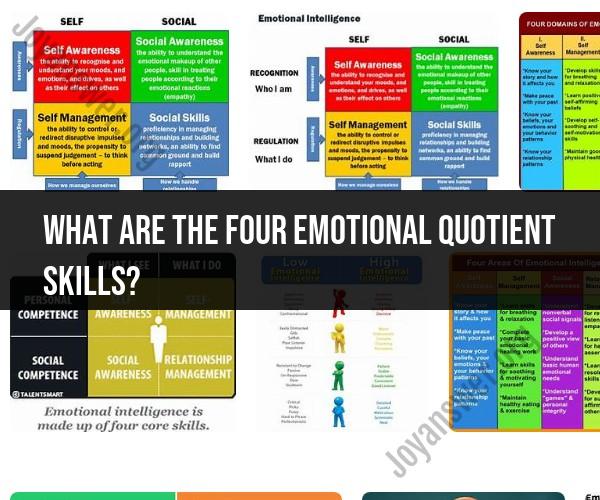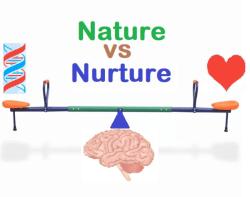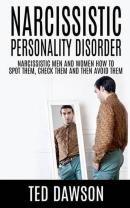What are the four emotional quotient skills?
Emotional intelligence, often referred to as Emotional Quotient (EQ), is a set of skills that involve recognizing, understanding, managing, and effectively using emotions in oneself and in interactions with others. There are several components of emotional intelligence, but four essential EQ skills are often emphasized:
Self-Awareness: This skill involves recognizing and understanding your own emotions, strengths, weaknesses, values, and motivations. Self-aware individuals have a clear understanding of how their emotions can influence their thoughts and behaviors. They can accurately assess their feelings and are in touch with their emotional state.
Self-Management: Self-management refers to the ability to control and regulate your own emotions and behaviors. It involves staying calm under pressure, managing stress, and adapting to changing circumstances. Individuals with strong self-management skills can effectively handle challenging situations, delay gratification, and remain in control of their impulses.
Social Awareness: Social awareness is about being attuned to the emotions and needs of others. It involves empathy, which is the ability to understand and share the feelings of others. People with high social awareness can read social cues, show understanding and compassion, and demonstrate an interest in the perspectives and emotions of those around them.
Relationship Management: Relationship management is the skill of effectively managing interpersonal interactions and relationships. It includes skills like communication, conflict resolution, collaboration, and building rapport. People with strong relationship management skills can navigate social situations, build and maintain positive relationships, and resolve conflicts constructively.
These four EQ skills are interconnected and are crucial for success in personal and professional life. They contribute to effective communication, teamwork, leadership, and overall emotional well-being. Developing and enhancing these skills can lead to better relationships, increased resilience, and improved decision-making in various aspects of life.
Emotional quotient (EQ), also known as emotional intelligence, is the ability to understand, manage, and use your own emotions, as well as the emotions of others. It is a critical skill for both personal and professional success.
There are four key EQ skills:
- Self-awareness: This is the ability to recognize and understand your own emotions, as well as how they affect your thoughts and behaviors.
- Self-regulation: This is the ability to manage your emotions in a healthy and constructive way.
- Social awareness: This is the ability to understand and empathize with the emotions of others.
- Relationship management: This is the ability to build and maintain strong relationships with others.
Mastering EQ Skills: The Fab Four
Here are some tips for mastering the four EQ skills:
Self-awareness:
- Pay attention to your thoughts and feelings. Notice how your emotions affect your behavior.
- Keep a journal to track your emotions and identify patterns.
- Ask for feedback from others on how your emotions come across.
Self-regulation:
- Take time to calm down before reacting to a situation.
- Use healthy coping mechanisms, such as exercise, relaxation techniques, or spending time with loved ones.
- Avoid impulsive decisions and behaviors.
Social awareness:
- Pay attention to the body language and facial expressions of others.
- Listen carefully to what others are saying, both verbally and nonverbally.
- Try to see things from other people's perspectives.
Relationship management:
- Be honest and open with others.
- Be a good listener.
- Be supportive and helpful.
- Be forgiving.
Building Emotional Intelligence: Exploring the Four EQ Skills
Here are some additional insights into the four EQ skills:
Self-awareness: Self-awareness is the foundation of EQ. It is important to be able to recognize and understand your own emotions in order to manage them effectively. You can also use self-awareness to identify your strengths and weaknesses, and to set realistic goals for yourself.
Self-regulation: Self-regulation is the ability to manage your emotions in a healthy way. This includes being able to control your impulses, delay gratification, and cope with stress in a productive way. Self-regulation is an important skill for building resilience and achieving your goals.
Social awareness: Social awareness is the ability to understand and empathize with the emotions of others. This skill is essential for building and maintaining strong relationships. When you are socially aware, you are able to see things from other people's perspectives and understand their feelings.
Relationship management: Relationship management is the ability to build and maintain strong relationships with others. This skill is important in all areas of life, including personal, professional, and social relationships. Relationship management involves being a good listener, being supportive and helpful, and being forgiving.
Emotional Quotient Essentials: A Closer Look at the Four Skills
EQ is a complex skill, but it is one that can be learned and developed. By focusing on the four key EQ skills of self-awareness, self-regulation, social awareness, and relationship management, you can improve your emotional intelligence and achieve greater success in all areas of your life.
Here are some additional tips for developing your EQ skills:
- Practice mindfulness. Mindfulness is the practice of paying attention to the present moment without judgment. It can help you to become more aware of your thoughts, feelings, and bodily sensations.
- Seek feedback from others. Ask trusted friends, family members, or colleagues for feedback on your EQ skills. This can help you to identify areas where you need to improve.
- Read books and articles about EQ. There are many resources available to help you learn more about EQ and how to develop your skills.
- Take an EQ training course. There are many EQ training courses available, both online and in person. These courses can provide you with the knowledge and skills you need to improve your EQ.
By investing in your EQ development, you can improve your personal and professional relationships, increase your resilience, and achieve greater success in all areas of your life.













